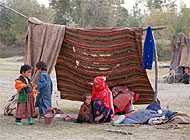Swiss aid director urges restraint, dialogue after attacks

The head of the Swiss Development Agency (SDA), Walter Fust, has called on the international community not to "screw the spiral of violence even higher" following terrorist attacks in New York and Washington.
His comments came as President George W Bush ordered the deployment of 100 warplanes to the Gulf region in preparation for a possible military strike against Afghanistan in the wake of the September 11 attacks.
Washington has threatened military strikes against the country unless the ruling Taliban hands over suspected terrorist Osama bin Laden, who has been accused of masterminding last week’s attacks in the United States.
In an interview with swissinfo, Fust said he was reminded of “what Tolstoy once wrote: ‘as you cannot extinguish fire by fire, you should not face evil with evil.'”
“Somebody has to start a dialogue and find ways and means of coping with the challenge,” he added.
Look at consequences
“I know it’s easier to say than to do, but I think the international community must look at the consequences and think far beyond instantaneous military intervention.”
Fust admitted aid organisations could not influence political or military decisions in the region.
The impact a US strike would have on Afghan civilians, argues Fust, will depend on whether an attack is focused on urban areas or whether military strategists will “consider an attack on military installations”.
Afghanistan’s urban population is reported to be fleeing to isolated mountain regions in fear of a possible US attack on the country.
“I very much hope that the authorities are fully aware of the implications of their decisions on the suffering of the civilian population,” Fust said, “but we have to accept that it is impossible to separate the civilian and non-civilian population during a military intervention.”
Afghans displaced by war, drought
Millions of Afghans, some 85 per cent of whom depend on agriculture for survival, have been displaced during two decades of war, economic ruin and drought.
“We should not forget that Afghanistan has been war-torn for the past 20 years and many people might come up with the question ‘Why again the civilian people?'” Fust told swissinfo.
Aid workers in Afghanistan have reported a deterioration in the humanitarian situation over the last three years.
The United Nations says the country is teetering on the brink of widespread famine, while Fust estimates that “at least one fifth” of the population of 25 million people in Afghanistan are suffering from hunger or malnutrition.
Food supplies in major cities, says Fust, are likely to last for no more than two to three weeks.
“Beyond that, we are looking at a tremendous disaster,” he added.
Fust said the SDA has earmarked SFr12-14 million for development and humanitarian relief programmes in Afghanistan.
The agency is mainly involved in supporting relief programmes in Afghanistan coordinated by the Independent Committee of the Red Cross and the United Nations.
Swiss aid workers serving in Afghanistan have been withdrawn from the country, but the SDA continues to maintain a liaison office staffed by a Swiss national over the border in Pakistan.
by Ramsey Zarifeh and Sally Mules

In compliance with the JTI standards
More: SWI swissinfo.ch certified by the Journalism Trust Initiative
You can find an overview of ongoing debates with our journalists here. Please join us!
If you want to start a conversation about a topic raised in this article or want to report factual errors, email us at english@swissinfo.ch.